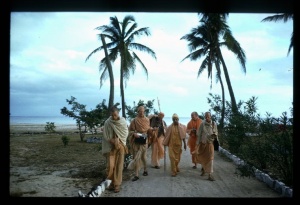SB 4.31.30

A.C. Bhaktivedanta Swami Prabhupada
TEXT 30
- śrī-śuka uvāca
- ity ānamya tam āmantrya
- viduro gajasāhvayam
- svānāṁ didṛkṣuḥ prayayau
- jñātīnāṁ nirvṛtāśayaḥ
SYNONYMS
śrī-śukaḥ uvāca — Śrī Śukadeva Gosvāmī said; iti — thus; ānamya — offering obeisances; tam — unto Maitreya; āmantrya — taking permission; viduraḥ — Vidura; gaja-sāhvayam — the city of Hastināpura; svānām — own; didṛkṣuḥ — desiring to see; prayayau — left that place; jñātīnām — of his kinsmen; nirvṛta-āśayaḥ — free from material desires.
TRANSLATION
Śukadeva Gosvāmī continued: Vidura thus offered obeisances unto the great sage Maitreya and, taking his permission, started for the city of Hastināpura to see his own kinsmen, although he had no material desires.
PURPORT
When a saintly person wants to see his kinsmen, he has no material desire to see them. He simply wants to give them some instructions so that they can benefit. Vidura belonged to the royal family of the Kauravas, and although he knew that all the family members were destroyed at the Battle of Kurukṣetra, he nonetheless wanted to see his elder brother, Dhṛtarāṣṭra, to see if he could deliver Dhṛtarāṣṭra from the clutches of māyā. When a great saintly person like Vidura sees his relatives, he desires only to deliver them from the clutches of māyā. Vidura thus offered his respectful obeisances to his spiritual master and departed for the city of Hastināpura, the kingdom of the Kauravas.